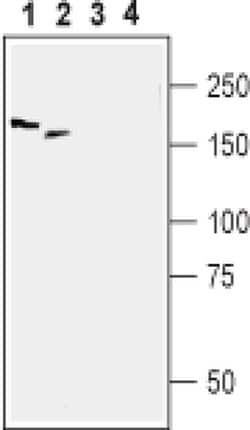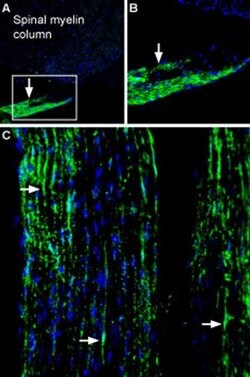Promotional price valid on web orders only. Your contract pricing may differ. Interested in signing up for a dedicated account number?
Learn More
Learn More
PRX Polyclonal Antibody, Invitrogen™
Rabbit Polyclonal Antibody
Supplier: Thermo Scientific PA577529
Description
Product is shipped at room temperature as a lyophilized powder and should be stored at -20 °C upon receipt. Reconstitution: add 50 μL of deionized water.
Prx encodes a protein involved in peripheral nerve myelin upkeep. The Prx protein contains 2 PDZ domains which were named after PSD95 (post synaptic density protein), DlgA (Drosophila disc large tumor suppressor), and ZO1 (a mammalian tight junction protein). Prx is a scaffolding protein that functions as part of a dystroglycan complex in Schwann cells, and as part of EZR and AHNAK-containing complexes in eye lens fiber cells. Prx is required for the maintece of the peripheral myelin sheath that is essential for normal transmission of nerve impulses and normal perception of sensory stimuli. Further, Prx is required for normal transport of MBP mRNA from the perinuclear to the paranodal regions and is required for normal re-myelination after nerve injury. Prx plays a role in normal elongation of Schwann cells and normal length of the internodes between the nodes of Ranvier. The demyelinated nodes of Ranvier permit saltatory transmission of nerve impulses; shorter internodes cause slower transmission of nerve impulses. As such, Prx is needed for the formation of appositions between the abaxonal surface of the myelin sheath and the Schwann cell plasma membrane; the Schwann cell cytoplasm is restricted to regions between these appositions. Prx is also involved for the formation of Cajal bands and of Schmidt-Lanterman incisures that correspond to short, cytoplasm-filled regions on myelinated nerves. Recruits DRP2 to the Schwann cell plasma membrane. Two alternatively spliced transcript variants have been described for the Prx gene which encode different protein isoforms and are targeted differently in the Schwann cell. Mutations in the Prx gene cause Charcot-Marie-Tooth neuoropathy, type 4F and Dejerine-Sottas neuropathy. Diseases associated with PRX include Charcot-Marie-Tooth Disease, Type 4F and Dejerine-Sottas Disease.
Specifications
| PRX | |
| Polyclonal | |
| Unconjugated | |
| PRX | |
| Periaxin | |
| Rabbit | |
| Antigen affinity chromatography | |
| RUO | |
| 19153, 57716, 78960 | |
| -20°C | |
| Lyophilized |
| Immunofluorescence, Immunohistochemistry (Frozen), Western Blot | |
| 0.85 mg/mL | |
| PBS with 1% BSA and 0.05% sodium azide; pH 7.4 | |
| O55103, Q63425, Q9BXM0 | |
| Prx | |
| Peptide (C)DVEFSFPKFSRLRR, corresponding to amino acid residues 155-170 of rat Periaxin | |
| 50 μL | |
| Primary | |
| Human, Mouse, Rat | |
| Antibody | |
| IgG |
Product Content Correction
Your input is important to us. Please complete this form to provide feedback related to the content on this product.
Product Title
Spot an opportunity for improvement?Share a Content Correction


